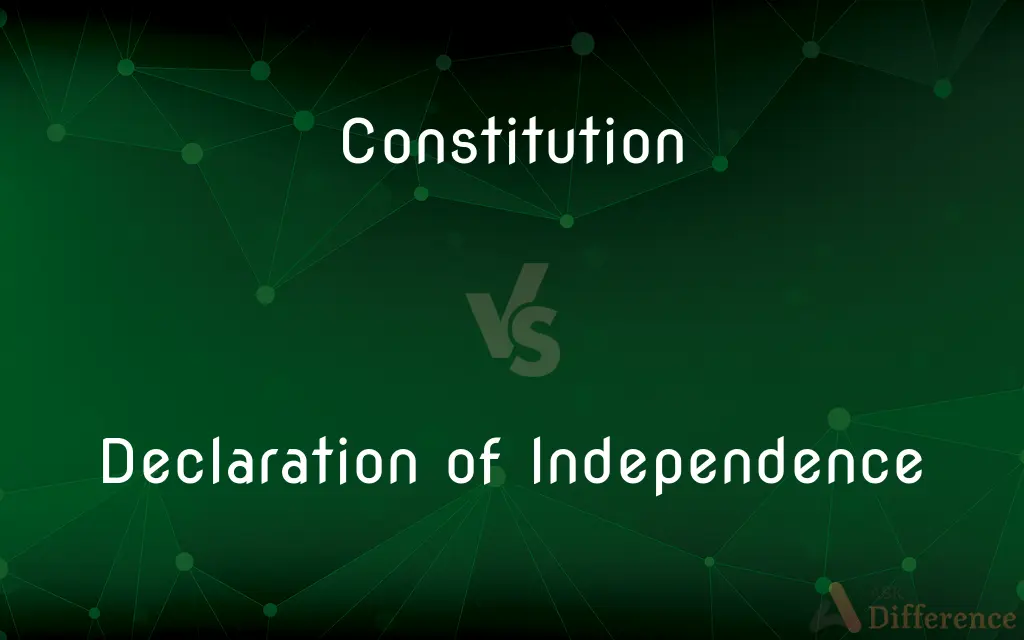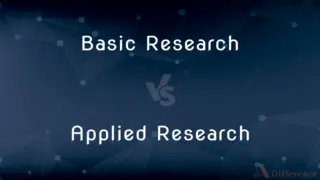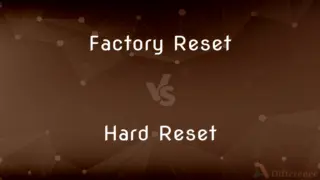Constitution vs. Declaration of Independence — What's the Difference?
Edited by Tayyaba Rehman — By Fiza Rafique — Published on November 9, 2023
Constitution refers to governing framework for a nation. Declaration of Independence refers to proclamation of separation from another entity.

Difference Between Constitution and Declaration of Independence
Table of Contents
ADVERTISEMENT
Key Differences
The Constitution is a set of fundamental principles according to which a state or other organization is governed. These rules together make up, i.e. constitute, what the entity is. On the other hand, the Declaration of Independence is a formal statement declaring the freedom of one entity from another.
The Constitution acts as the supreme law that dictates the structure, functions, and limitations of a government. It's the foundation of a country's legal and political system. The Declaration of Independence, however, is a document that asserts the rights and independence of a nation, typically from colonial rule or another form of oppression.
A Constitution is a living document; many are designed to be amended to reflect the changing needs of a society. In contrast, the Declaration of Independence is historically fixed, marking the birth of a sovereign nation at a specific moment in time.
The authors of a Constitution provide the framework for a government and its citizens to operate in a cohesive manner. Those who draft a Declaration of Independence are more focused on establishing the reasons that justify a nation's right to sovereignty.
Nations rely on their Constitution for governance but refer to their Declaration of Independence to remember their struggle for freedom and the principles their sovereignty was founded upon.
ADVERTISEMENT
Comparison Chart
Spelling
C, O, and N present
D, E, and C present
Syllables
Four
Nine
Letters
13
26
Consonant to Vowel Ratio
8:5
15:11
Word Origin
Latin origin
Middle English/French origin
Compare with Definitions
Constitution
The act of forming or establishing something.
The constitution of the committee took several weeks.
Declaration of Independence
A document declaring the formal separation of a new sovereign nation from its previous state.
The American Declaration of Independence was signed in 1776.
Constitution
The system of beliefs and laws by which a country, state, or organization is governed.
The U.S. Constitution ensures balance through three branches of government.
Declaration of Independence
An assertion of individual autonomy.
His move to a new city was his personal Declaration of Independence.
Constitution
The composition of something.
The molecular constitution of the compound is unique.
Declaration of Independence
A proclamation of a state's rights and values.
The country's Declaration of Independence emphasized equality and justice.
Constitution
A written record of the fundamental principles of an organization.
The club's constitution clearly stipulates membership requirements.
Declaration of Independence
A historical document significant to a nation's history.
The original Declaration of Independence is preserved in the National Archives.
Constitution
The physical health and condition of a person.
Her constitution was strengthened by daily exercise.
Declaration of Independence
A symbol of freedom from oppression.
For many, the Declaration of Independence inspires the pursuit of liberty.
Constitution
The act or process of composing, setting up, or establishing.
Constitution
The composition or structure of something; makeup.
Constitution
The physical makeup of a person
Having a strong constitution, she had no trouble climbing the mountain.
Constitution
The system of fundamental laws and principles that prescribes the nature, functions, and limits of a government or another institution.
Constitution
The document in which such a system is recorded.
Constitution
Constitution The supreme law of the United States, consisting of the document ratified by the original thirteen states (1787-1790) and subsequent amendments.
Constitution
The act, or process of setting something up, or establishing something; the composition or structure of such a thing; its makeup.
Constitution
(government) The formal or informal system of primary principles and laws that regulates a government or other institutions.
Constitution
(law) A legal document describing such a formal system.
Constitution
(Catholicism) A document issued by a religious authority serving to promulgate some particular church laws or doctrines.
Constitution
A person's physical makeup or temperament, especially in respect of robustness.
He has a strong constitution, so he should make a quick recovery from the illness.
Constitution
(dated) The general health of a person.
Constitution
The act or process of constituting; the action of enacting, establishing, or appointing; enactment; establishment; formation.
Constitution
The state of being; that form of being, or structure and connection of parts, which constitutes and characterizes a system or body; natural condition; structure; texture; conformation.
The physical constitution of the sun.
Constitution
The aggregate of all one's inherited physical qualities; the aggregate of the vital powers of an individual, with reference to ability to endure hardship, resist disease, etc.; as, a robust constitution.
Our constitutions have never been enfeebled by the vices or luxuries of the old world.
Constitution
The aggregate of mental qualities; temperament.
He defended himself with . . . less passion than was expected from his constitution.
Constitution
The fundamental, organic law or principles of government of men, embodied in written documents, or implied in the institutions and usages of the country or society; also, a written instrument embodying such organic law, and laying down fundamental rules and principles for the conduct of affairs.
Our constitution had begun to exist in times when statesmen were not much accustomed to frame exact definitions.
Constitution
An authoritative ordinance, regulation or enactment; especially, one made by a Roman emperor, or one affecting ecclesiastical doctrine or discipline; as, the constitutions of Justinian.
The positive constitutions of our own churches.
A constitution of Valentinian addressed to Olybrius, then prefect of Rome, for the regulation of the conduct of advocates.
Constitution
Law determining the fundamental political principles of a government
Constitution
The act of forming something;
The constitution of a PTA group last year
It was the establishment of his reputation
He still remembers the organization of the club
Constitution
The way in which someone or something is composed
Constitution
United States 44-gun frigate that was one of the first three naval ships built by the United States; it won brilliant victories over British frigates during the War of 1812 and is without doubt the most famous ship in the history of the United States Navy; it has been rebuilt and is anchored in the Charlestown Navy Yard in Boston
Common Curiosities
Qan the Constitution be changed?
Aes, most constitutions have provisions for amendments—changes or additions to the original document.
Qhat are the key principles of the Constitution?
Ahe Constitution typically includes principles like the rule of law, separation of powers, and fundamental rights.
Qhat is the Constitution?
Ahe Constitution is a foundational document outlining the guiding principles and laws of a nation or organization.
Qhat does the Declaration of Independence represent?
Ahe Declaration of Independence is a statement asserting a nation's autonomy and the reasons for its separation from another power.
Qow often is the Constitution amended?
Ahis varies by country, but constitutional amendments generally require significant legal processes and are not frequent.
Qho wrote the Declaration of Independence?
Ahomas Jefferson is credited with drafting the Declaration of Independence.
Qre there global standards for Declarations of Independence?
Ao, they are unique documents tailored to each nation's circumstances.
Qoes the Declaration of Independence have legal authority?
Ahile historically significant, it doesn't hold the same legal authority as a constitution or legislative documents.
Qhy is the Declaration of Independence significant?
At marks a nation's claim to sovereignty, often listing grievances against oppressive forces.
Qs the Declaration of Independence recognized internationally?
Aes, especially in the context of historical significance and the sovereignty of nations.
Qhat are the effects of the Declaration of Independence?
At establishes a nation's rights and sovereignty, often inspiring similar actions by other groups.
Qho is responsible for upholding the Constitution?
All branches of government are responsible, with the judiciary typically interpreting its legality.
Qhat's the relationship between the Constitution and federal laws?
An many countries, the Constitution is the supreme law, and federal laws are subordinate to it.
Qhat happens if a section of the Constitution is violated?
Ahere are usually judicial review and legal processes to address any violation.
Qan anyone propose an amendment to the Constitution?
Ahe process varies, but generally, specific government bodies propose amendments.
Share Your Discovery

Previous Comparison
Basic Research vs. Applied Research
Next Comparison
Factory Reset vs. Hard ResetAuthor Spotlight
Written by
Fiza RafiqueFiza Rafique is a skilled content writer at AskDifference.com, where she meticulously refines and enhances written pieces. Drawing from her vast editorial expertise, Fiza ensures clarity, accuracy, and precision in every article. Passionate about language, she continually seeks to elevate the quality of content for readers worldwide.
Edited by
Tayyaba RehmanTayyaba Rehman is a distinguished writer, currently serving as a primary contributor to askdifference.com. As a researcher in semantics and etymology, Tayyaba's passion for the complexity of languages and their distinctions has found a perfect home on the platform. Tayyaba delves into the intricacies of language, distinguishing between commonly confused words and phrases, thereby providing clarity for readers worldwide.











































